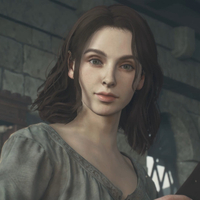There's a rare kind of magic in Dragon's Dogma 2's blend of old-fashioned roleplaying and peak Capcom combat
Dragon's Dogma knows how to make getting lost just as compelling as any quest it could give you.
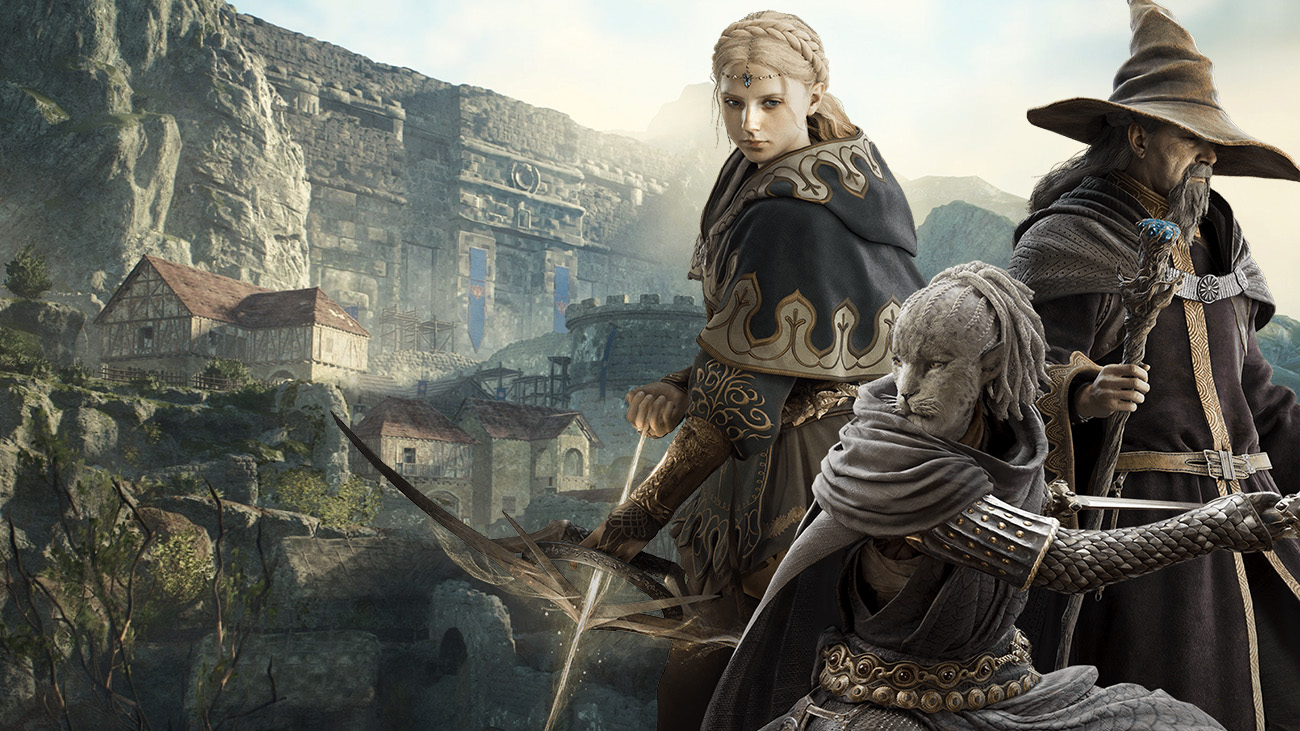
I learned from the movies that the best way to unearth a criminal conspiracy is to follow the money. That advice also applies to understanding videogames: feel out where a game dedicated the big bucks and you'll get a sense of where its heart truly lies.
In Baldur's Gate 3, the money went into the cinematic motion captured conversations, which imbue the endless dialogue with an animated sense of life that Larian had never managed in its older games. In Dragon's Dogma 2, this year's long-awaited RPG sequel, I could immediately tell the money did not go into its conversations in the same way. Walking through a small stopover town alongside a road that wound through open wilderness in either direction, villagers began hailing me with quests and news, yanking away control of my camera and spinning it 180 degrees to face them as they told me about a missing son or local mystery.
I felt like I was wearing a neon sign that said "LOVES QUESTS," or maybe "PLAYER CHARACTER"—it was the funniest first 10 minutes of a game I've played in a long time, a jarring and slightly charming throwback to 15 or 20 years ago, when big-budget games weren't yet spending their money everywhere to polish even the smallest interactions until not a spot of friction remains. Capcom has never made an RPG of this scale before; does it know how to make an RPG of this scale? Was there a more subtle path to take here than three villagers yelling "Hail, Arisen!" at me within five minutes and wresting away my controls?
Probably, but I didn't get the sense this is where Dragon's Dogma 2 put its money. In fact, after picking up a few quests I proceeded to completely ignore them for the three hours I spent absorbed in traipsing across just a tiny portion of the vast open world. This is where the money went: into a world where you may stumble upon a cyclops smashing a dragon in the face with a club, where a griffon may drop out of the sky to ruin your day, where every class has its own Dante-deep list of skills to pick and choose from.
The scale of the action here makes Devil May Cry 5 (this team's previous game) with its three characters and linear levels seem like a warm-up exercise.
I split my Dragon's Dogma 2 demo time between two of its high level vocations (classes): the Mystic Spearhand and Magic Archer. Without Capcom doing a little save file cheating for me I wouldn't have access to these classes or their powerful skills until many hours into the game, but jumping into Dragon's Dogma 2 with a full complement of skills and decent gear let me quickly come to grips with just how fun its combat can be.
View post on imgur.com"
As the Mystic Spearhand I felt a bit slow at first, lumbering towards enemies in heavier armor while emitting a rapid-fire turquoise magic blast from my hand to stagger enemies until I got into range. But once I got to know my skills better I stopped walking and started relying on the class's best skill to magically hurl myself forward or into the air to catch flying enemies, ending with a lunging spear strike that can seamlessly combo into a swirl of slices.
Keep up to date with the most important stories and the best deals, as picked by the PC Gamer team.
And while in the air, wouldn't it feel great to have a downward attack to skewer any enemy below you with a vicious plunge to the ground? Buddy, this is a Capcom game—you bet that's in there.
I felt even more empowered as the Magic Archer, which let me stand back from the melee and pepper enemies with rapid-fire homing bolts or charged up magical arrows with elemental effects. Griffons, it turns out, really do not like being lit on fire, making them easy to stagger with an explosive arrow. Other enemies will shrug off that fire damage but can be effectively frozen with some ice arrows or zapped out of their boots with lightning. When a cyclops did get close enough to batter me with his club I wasn't nearly as tanky as I'd been as the Mystic Spearhand and had trouble landing my bow shots, leaving me to scurry away and call over my NPC Pawn allies to save my skin.
That was more like the Dragon's Dogma experience I remembered. In the original game I spent a lot of my time getting my ass kicked by random brigands in the opening area. I played long enough to see glimmers of the RPG people deeply love, but never made it past a brief infatuation that ended with one too many trudges across the same field. For all I know that'll happen again in the sequel when I don't get to jump in on a conveniently leveled up save file, but starting as a more powerful character helped me see the ideal version of this game, where just walking from place to place is engaging enough to make me forget about quests for awhile and just breathe it in.
View post on imgur.com"
Call to adventure
Dragon's Dogma 2 director Hideaki Itsuno sparked some controversy by saying that on-foot travel (and a lack of fast travel) is only boring if your game is boring, and you can see that philosophy coursing through this game. When you step out onto a cliff and see the full explorable world before you, Dragon's Dogma 2 makes you feel small. Small in a way that Elden Ring or The Witcher 3 or Skyrim never do, because those games let you pull up a map to casually warp halfway across the world, or hop on a horse and gallop across an expanse in a few minutes. Dragon's Dogma 2 does offer some fast travel options, but hoofing it is the default experience. It's the rare open world 3D RPG that really evokes the experience of venturing into an '80s or '90s PC dungeon crawler like The Bard's Tale; you don't know where you are, or where you're going, but the only way you're going to get there is to walk on.
The trick Dragon's Dogma 2 pulls, the thing that makes it unlike any other RPG, is that in a blink you go from a speck on a cliffside to an action hero in combat. Up close the average villager in this game looks about as ugly as the typical bowl cut sod in The Witcher 3, a nine-year-old game; but in combat the animations and particle effects are glorious. There's a heft to movement—even moreso than in Monster Hunter World I felt physics at play when my Mystic Spearhand flopped around on the back of a troll as it leapt up to the side of a cliff and tried to shake me off. But you can still feel the lighter Devil May Cry legacy in the balance of flowing combos and special moves and how you thread the two together.
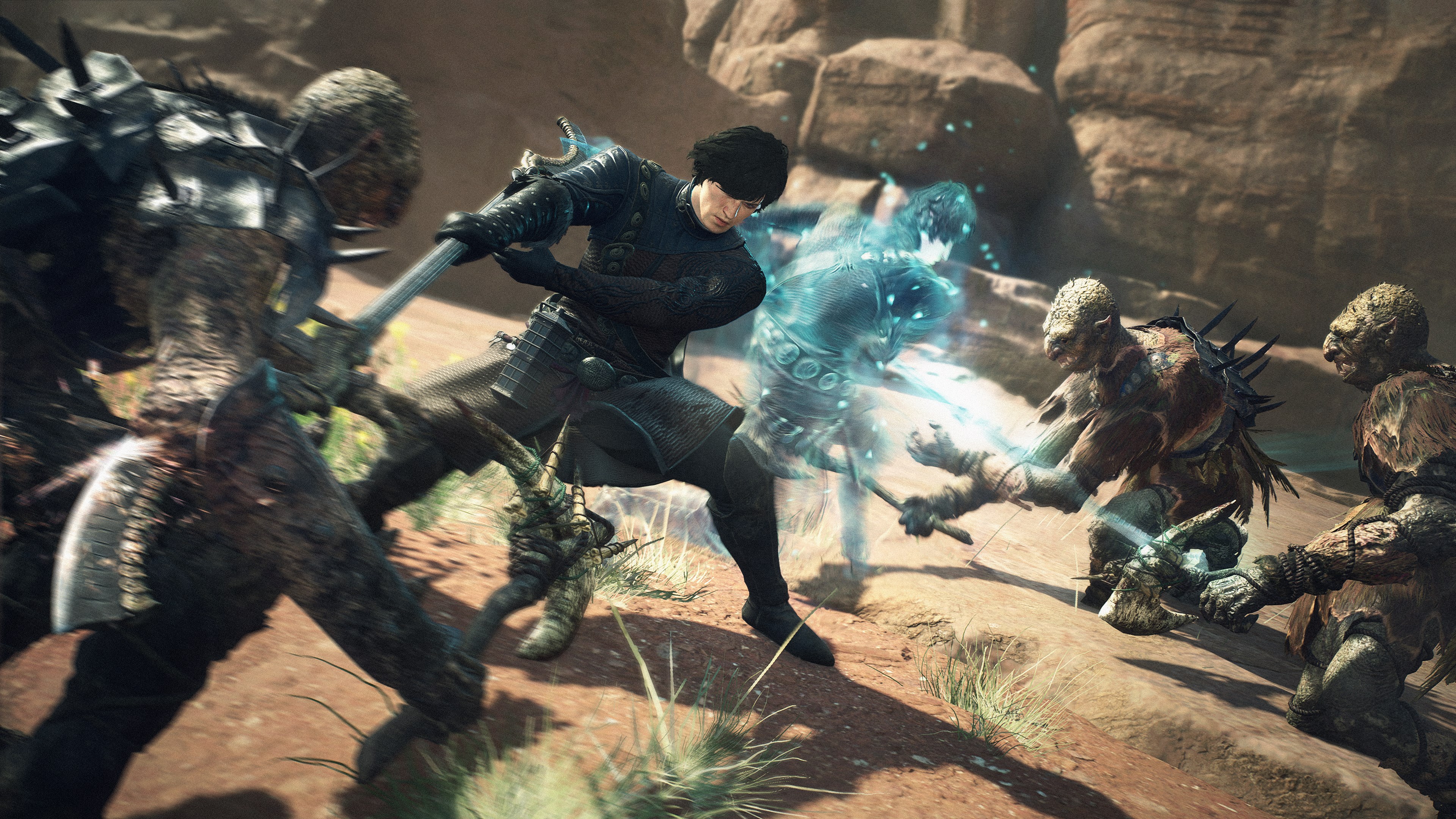
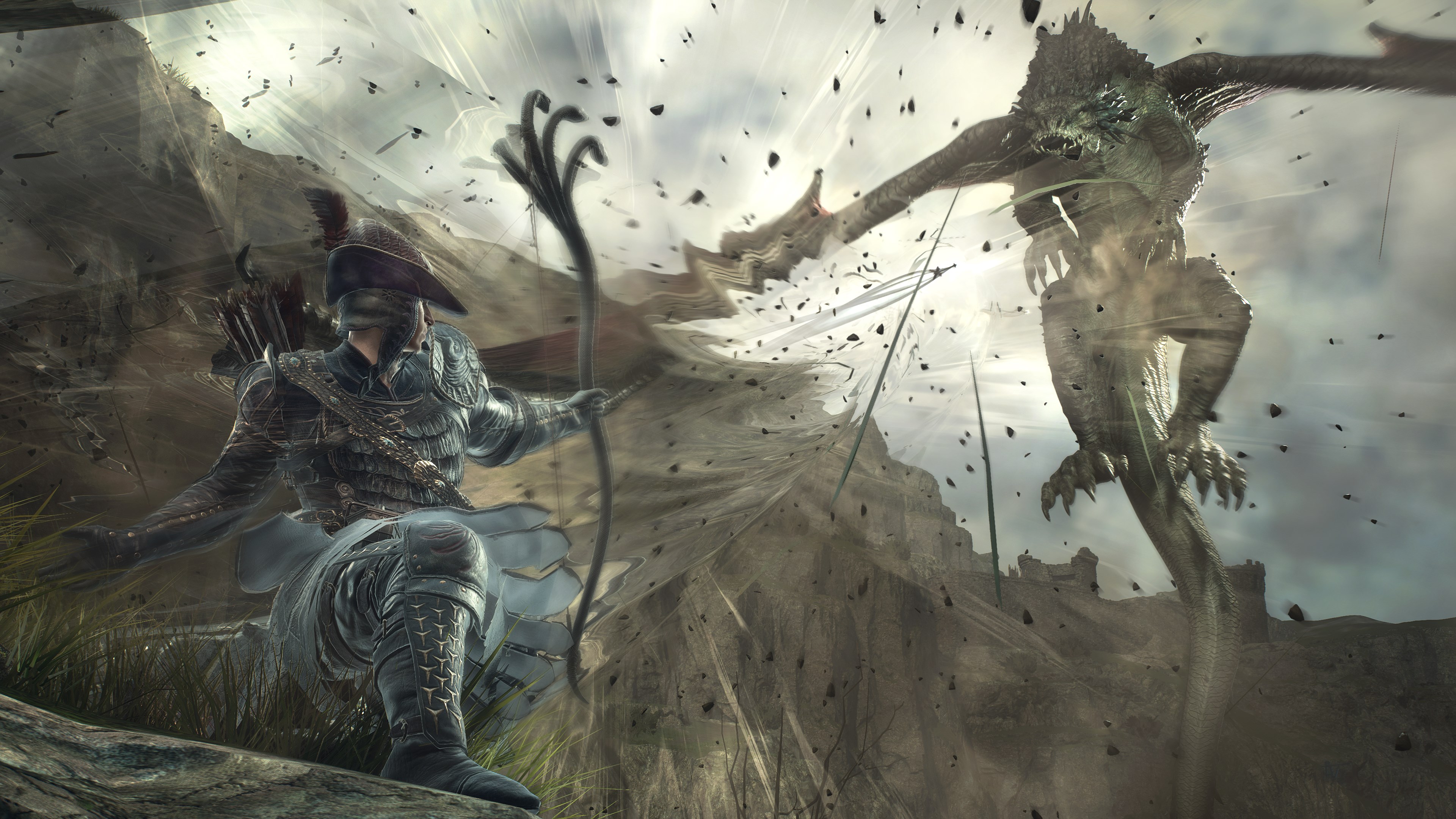
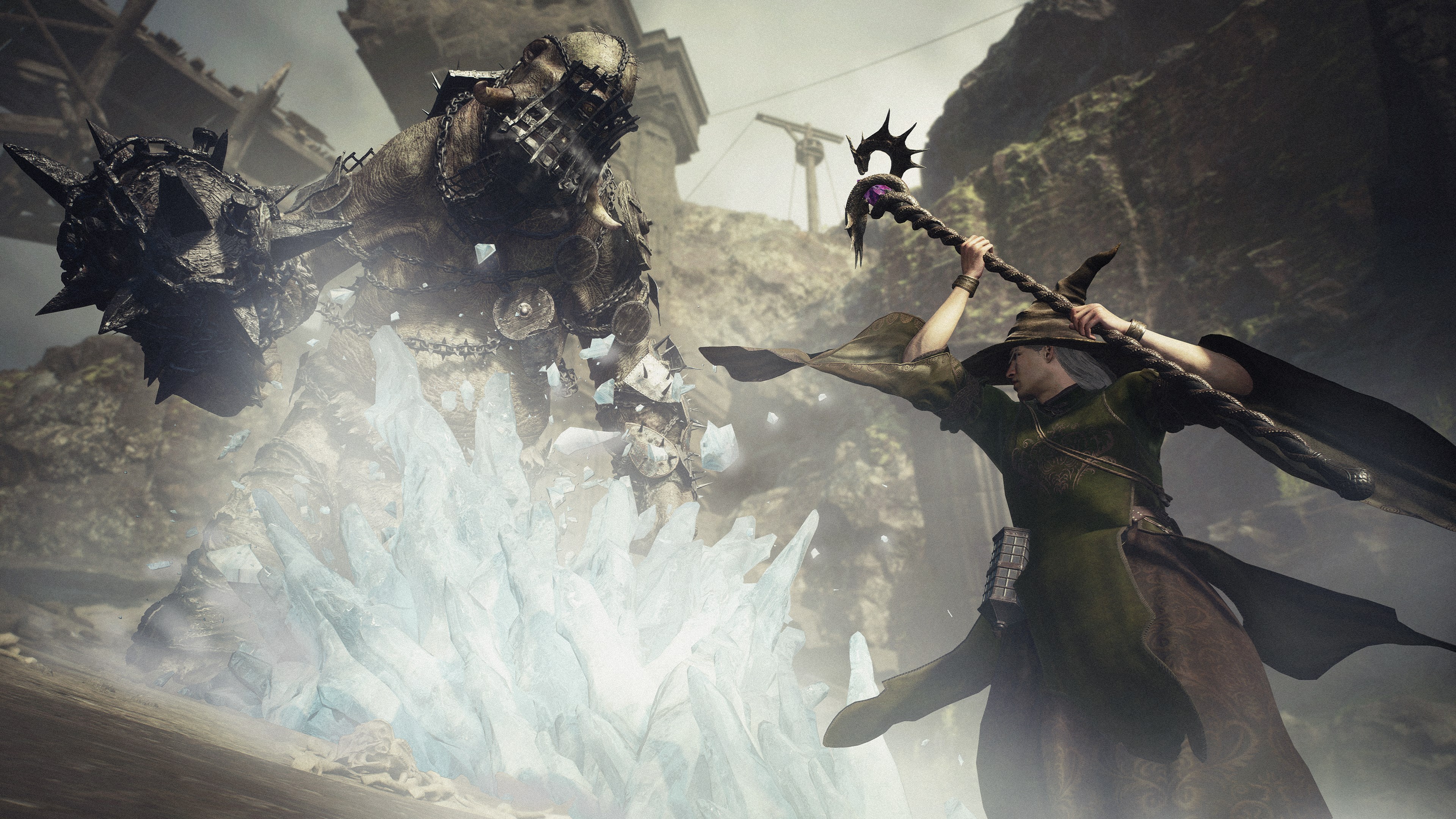
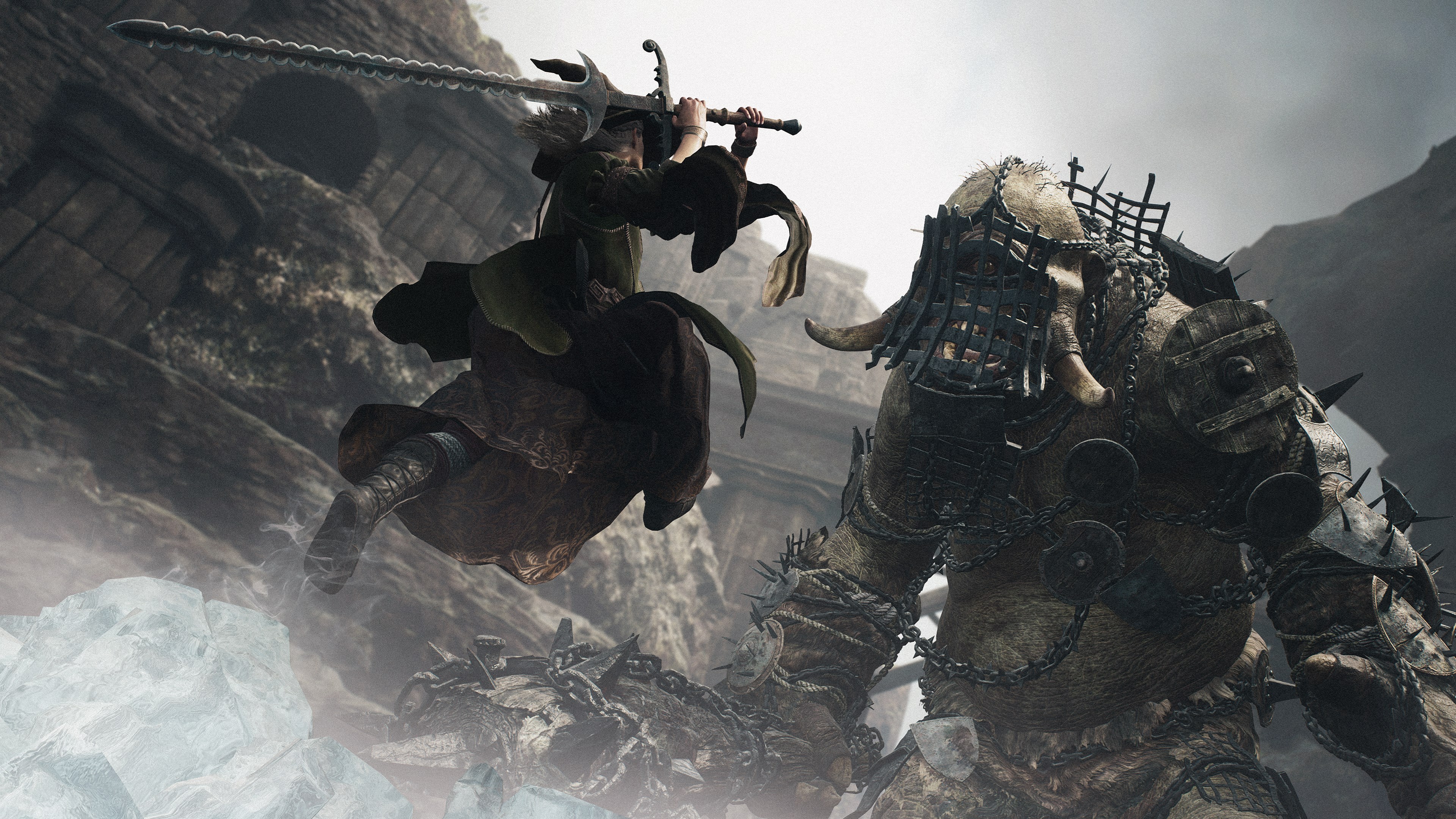
Where Elden Ring empowers you to quickly traverse the world but hums with a constant nervous edge every time you commit to a sword swing in combat, Dragon's Dogma 2 does the reverse. Smash on those buttons and watch some cool stuff happen; combat is your moment to shine.
Perhaps that experience changes over the full run of Dragon's Dogma 2, as you gradually find points to warp between and quests that offer a more guided path through the world. But reflecting on the few hours I played, I can see what Itsuno meant when he told me that he used the decade year gap between games to look back on what he originally hoped to accomplish, and pushed that forward with today's technology.
At a glance Dragon's Dogma 2 does indeed look awfully similar; dated, even. But pay attention to where the budget has gone—combat animations that set a new high bar, a world that truly demands you find your own way through it—and you can see a vision for a subtly different kind of roleplaying game than anyone else is making. In an RPG atmosphere still heavy with the memory of Baldur's Gate 3 I'm not sure it's exactly what people are looking for right now. Or maybe it's exactly the right time for a game that is both this stubborn and this decadent. Capcom looked back at the game that struggled to find its audience 12 years ago, and instead of reimagining it, decided to make a sequel that's even more Dragon's Dogma than Dragon's Dogma was.
Maybe this time people are ready for it. It's out March 21st.
Beginner tips: Arise Arisen
Dragon's Dogma 2 fast travel: Take an ox cart
How to start a new game: Start again
Dragon's Dogma 2 pawns: Build your party
How to change appearance: Makeover

Wes has been covering games and hardware for more than 10 years, first at tech sites like The Wirecutter and Tested before joining the PC Gamer team in 2014. Wes plays a little bit of everything, but he'll always jump at the chance to cover emulation and Japanese games.
When he's not obsessively optimizing and re-optimizing a tangle of conveyor belts in Satisfactory (it's really becoming a problem), he's probably playing a 20-year-old Final Fantasy or some opaque ASCII roguelike. With a focus on writing and editing features, he seeks out personal stories and in-depth histories from the corners of PC gaming and its niche communities. 50% pizza by volume (deep dish, to be specific).
